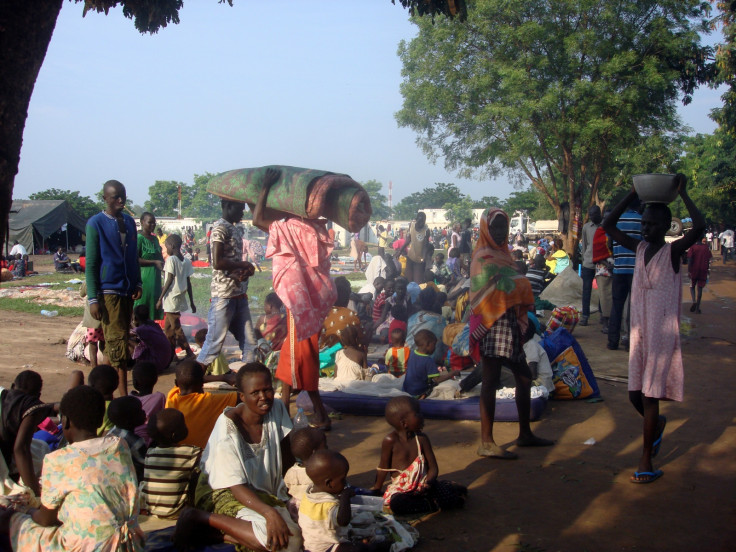South Sudan: Recent violence will not jeopardise peace process says envoy
EXCLUSIVE:IBTimes UK interviews South Sudanese ambassador on renewed violence in Juba and peace deal

Renewed violence which left hundreds dead in South Sudan will not jeopardise the peace process aimed at ending a two-year-long civil war, an official has told IBTimes UK. Sabit A Alley, South Sudanese ambassador to the UK, made the comments as foreign governments and organisations are urging their citizens and personnel to evacuate the capital Juba, where hundreds were killed in recent days.
"The government is committed to the implementation of the Peace Agreement on the Resolution of the Conflict in the Republic of South Sudan," said Alley. "There is no reason to believe that the peace process is at risk unless the opposition chooses not to follow through with the process."
Earlier in July, more than 200 people were killed and thousands displaced in and around Juba during clashes between warring factions loyal to President Salva Kiir and Vice-president and rebel leader Riek Machar. The government announced a unilateral ceasefire and both Kiir and Machar ordered government and rebel forces to cease hostilities.
The latest outbreak of violence occurred as the country, the world's newest nation, marked its fifth year of independence from Sudan on 9 July. Machar's return to South Sudan and his reinstatement as vice-president in April had restored hopes for the implementation of the peace process signed in August 2015.
However, tensions have been running high since Machar's return amid fears the new wave of violence might plunge the country back into civil war.
What triggered the latest violence?
It is not yet clear what triggered the latest wave of violence. However, some reports suggested that a disagreement at a checkpoint in the outskirts of Juba between rival soldiers led to a shoot-out on Thursday (7 July) night that escalated into fighting.
Alley, however, blamed forces loyal to Machar for the latest unrest, claiming members of the Sudan People's Liberation Movement in Opposition (SPLA-IO) attacked the checkpoint. He also alleged that, the following day, Machar's forces were deployed around the Presidential Palace and shot one of the guards as Kiir was meeting his two deputies regarding the incident at the checkpoint.
"The killing of the guard resulted in the eruption of gun-fire between the two forces. However, the following day, which was the Independence Day [Sunday, 9 July] , the situation in the capital was calm but tense," explained Alley. "Then on July 10 and 11, Riek's forces again attacked a checkpoint on the Juba-Yei thus resulting in intensive fighting in the town. The fighting was brought to an end in the evening of July 11 following the declaration of ceasefire by the President. It is clear that Riek Machar is responsible for this fresh violence."
However, rebels forces claimed government troops attacked their positions in Juba. Machar's military spokesman, Col William Gatjiath, accused officials loyal to the president of lying for claiming that calm had been restored.
"The situation in South Sudan is uncontrollable because Salva Kiir and his followers are not ready to follow the peace agreement," Gatjiath said, according to the BBC.
South Sudan's descent into civil war
South Sudan descended into civil war in 2013 when Kiir, of the Dinka ethnic group, fired his deputy Riek Machar, from the Nuer group, and his cabinet.
August 2015 peace deal: the key elements
- Both parties commit to immediate cessation of violence
- Machar to be reinstated as vice-president
- Foreign troops to be withdrawn
- Military personnel in Juba to be replaced by police and guards
- Creation of transitional government that will stay in power for 30 months
- Presidential elections to be held 30 days before end of transitional government mandate
- Probe into abuses committed during conflict
For the full document, click here
Ethnic-related violence then spread, with militia groups carrying out attacks in villages and areas known to be inhabited by either Dinka or Nuer tribes.
More than 10,000 civilians have so far been killed in the conflict, amid allegations of crimes against humanity committed by both sides, including extra-judicial killings, abductions, rape, torture and use of child soldiers.
At least two million people have also been displaced.
Although the warring factions have signed at least seven peace deals, violence has continued, and a January report from the African Union blamed both leaders for the ongoing unrest.
© Copyright IBTimes 2025. All rights reserved.






















